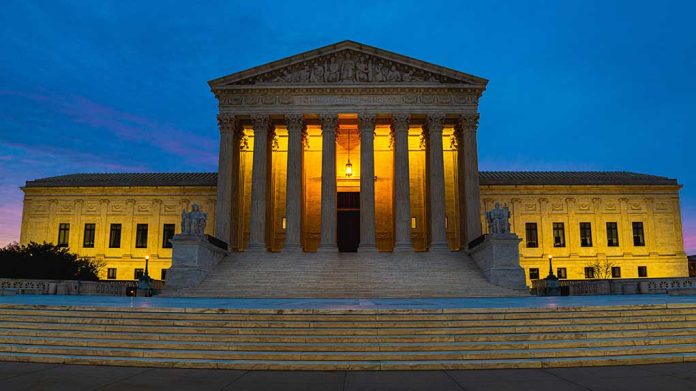
The Supreme Court’s decision not to review Boston’s controversial school admissions policy leaves questions unanswered about race-based considerations in education.
At a Glance
- Supreme Court rejected an appeal challenging Boston’s temporary admissions policy for elite high schools
- Policy allegedly discriminated against White and Asian students by using ZIP codes instead of entrance exams
- Justices Alito and Thomas dissented, expressing concerns about perpetuating race-based affirmative action
- Case dismissed due to policy revision, but debate over admissions criteria continues
Supreme Court Declines to Hear Boston School Admissions Case
The U.S. Supreme Court has rejected an appeal from Boston parents regarding a temporary admissions policy for the city’s elite high schools. The policy, implemented during the COVID-19 pandemic, replaced traditional entrance exams with a system based on grades and ZIP codes. This change allegedly led to a decrease in White and Asian student admissions, sparking controversy and legal challenges.
The case centered on the Boston Latin Schools, Boston Latin Academy, and the John D. O’Bryant School of Mathematics and Science. In 2020, these prestigious institutions suspended their entrance exams due to pandemic-related safety concerns. Instead, they adopted a method that considered students’ grade point averages and the socioeconomic characteristics of their neighborhoods.
Supreme Court rejects Boston parents' appeal claiming racial bias in an admissions policy https://t.co/QbZBoUqUEu
— Fox News (@FoxNews) December 10, 2024
Legal Challenges and Lower Court Rulings
The Boston Parent Coalition for Academic Excellence sued the Boston School Committee in 2021, arguing that the new admissions criteria violated the Supreme Court’s recent decision on affirmative action in college admissions. However, lower courts ruled that the admissions criteria were racially neutral and did not violate constitutional protections.
“The parents and students do not challenge Boston’s new policy, nor do they suggest that the city is simply biding its time, intent on reviving the old policy. Strictly speaking, those developments may not moot this case. But, to my mind, they greatly diminish the need for our review.” – Justice Neil Gorsuch
The 1st U.S. Circuit Court of Appeals upheld the policy, stating that the Supreme Court’s decision on race-conscious college admissions did not affect Boston’s temporary measures. This ruling set the stage for the appeal to the Supreme Court, which ultimately declined to hear the case.
Dissenting Opinions and Ongoing Concerns
While the majority of the Supreme Court chose not to review the case, Justices Samuel Alito and Clarence Thomas voiced strong dissent. They argued that the lower court’s ruling represented a “glaring constitutional error” that could perpetuate race-based affirmative action in defiance of recent Supreme Court decisions.
“a glaring constitutional error that threatens to perpetuate race-based affirmative action in defiance of” – Alito
Justice Neil Gorsuch, while not joining the dissent, expressed his own reservations about the policy. However, he noted that the case did not require the Court’s review since the policy had already been revised. The Boston School Committee has since implemented a new standardized testing plan for the 2022-2023 school year, rendering the original dispute largely moot.
Supreme Court rejects appeal from Boston parents over race bias in elite high school admissions https://t.co/bm5o7ylF1a
— Daily Press (@Daily_Press) December 9, 2024
Implications for Future Admissions Policies
The Supreme Court’s decision not to hear this case leaves open questions about how schools can consider diversity in admissions without running afoul of recent rulings against race-conscious policies. The debate over fair and equitable admissions criteria is likely to continue, as schools across the nation grapple with balancing academic merit, socioeconomic factors, and the goal of maintaining diverse student bodies.
As the dust settles on this particular case, educators, policymakers, and parents will be watching closely to see how future admissions policies are shaped and challenged in the wake of the Supreme Court’s stance on affirmative action in education.
Sources:
- Supreme Court rejects Boston parents’ appeal claiming racial bias in an admissions policy
- Supreme Court rejects appeal from Boston parents over race bias in elite high school admissions
- Supreme Court rejects appeal from Boston parents over race bias in elite high school admissions
- Supreme Court rejects appeal from Boston parents over race bias in elite high school admissions






